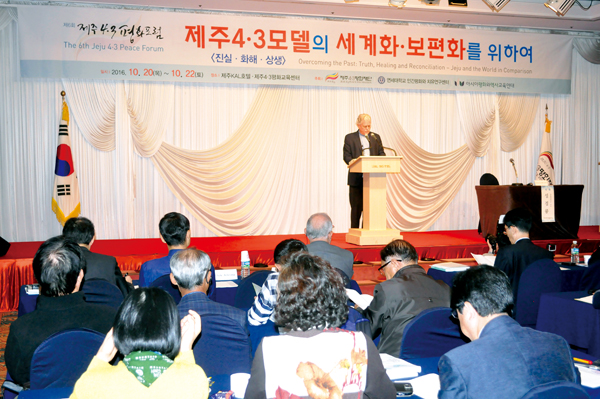| |
 |
|
| ▲ Bruce Cumings at the Jeju 4.3 Peace Forum Photo by The Jeju Weekly |
The 6th Jeju 4.3 Peace Forum was held from Oct. 20-22 with the theme ‘Overcoming the Past: Truth, Healing and Reconciliation - Jeju and the World in Comparison.’
Over the two days, the 4.3 Peace Forum held a number of speeches relating to the 4.3 incident as well as looking at the reconciliation process seen after other conflicts throughout the world.
The keynote speaker at the event was Bruce Cumings, a historian from the University of Chicago who specializes in Korean and East Asian History.
His speech, titled ‘American Responsibility and The Massacres in Cheju’, explored the role of the US in the 4.3 incident as well as the ways that truth plays an important part in the reconciliation process after conflicts.
In terms of direct US involvement, he brought up a number of examples including, “overseeing the suppression, the daily training of counter-insurgent sources, interrogation of prisoners, and the use of American spotter planes to ferret out guerrillas.”
This was part of an overall campaign run by the Korean state forces of the time to rid Jeju island of the rebels that they accused of being communist sympathisers. The campaign, however, soon moved beyond that and ended up causing a huge number of deaths and destroying many of the island’s villages.
Of course, the pain from the 4.3 massacre didn’t simply stop once the atrocities were finished and ‘peace’ was restored to the island.
With the Korean War starting soon after the end of the 4.3 incident, and the fact that Jeju was thought to potentially have sympathy with the North Korean communist forces, there was a continued attempt to stop any potential rebellion on Jeju.
Bruce Cumings described measures including, “the collection of radio’s from the entire population so they could not find out about the North Korean advance on the mainland” as well as police control of the only phone lines.
This continued attempt to hide truth made it near impossible for people affected by the killings on Jeju to gain any kind of real understanding or reconciliation on the matter.
This was made worse by the Law of Complicity that came into force after 4.3. Bruce Cumings explained that “if one relative was labeled a communist, the entire family's life chances were jeopardized for decades”.
This meant that situations arose were by to make it easier to get by in life, people whose family members were accused of being communists and killed by right-wing youth squads often found it better to simply say that they were, in actual fact, killed by communists.
Bruce Cummings pointed out that while this kind of adaptation of the truth may provide relief in the physical life of the sufferer, the lack of real truth and the removal of the opportunity for truth and reconciliation will continue to haunt them.
In fact, he continually spoke of the need for the truth as a crucial part of the reconciliation process.
He used a number of examples of how truth has been used as part of reconciliation attempts to highlight this. These ranged from the reconciliation processes in South Africa and its focus on four definitions of truth to the example of a small Korean village called Kurin on the southwest coast of the mainland.
South Africa’s reconciliation process provides a model due to its four definitions of the word truth. These include forensic truth(physical evidence), eyewitness truth(reports from victims), scholarly truth(historians and documents) and perpetrator’s truth(Reports from the aggressors).
By allowing all these truths to have their say in the reconciliation process, Bruce Cumings suggested that, “it is a method for letting all the relevant parties have their say, for achieving a social or “dialogue” truth, a healing or restorative truth, a way to allocate justice and assess punishment, all in the interest of reconciliation rather than revenge or self-justification.”
In the case of the Kurin, the village was one of many that, like villages on Jeju, experienced conflict between communist supporting guerrillas and government forces that dragged innocent civilians into the middle of the conflict.
This lead to a huge number of deaths that affected just about every family in the village. However, the village managed to deal with this as the village elders collectively decided after the conflict to name the war dead and honour them with joint memorial services, without naming who had killed whom.
The key here was that the villagers didn’t try to assign blame, rather they wanted to focus on understanding and reconciliation between the two sides.
Bruce Cummings ended the lecture with the thought that in terms of the violence seen in Jeju and Korea, now the forensic truth has mainly been established “the personal truths of the victims and survivors should become a restorative truth” that allows reconciliation on both sides. |




















